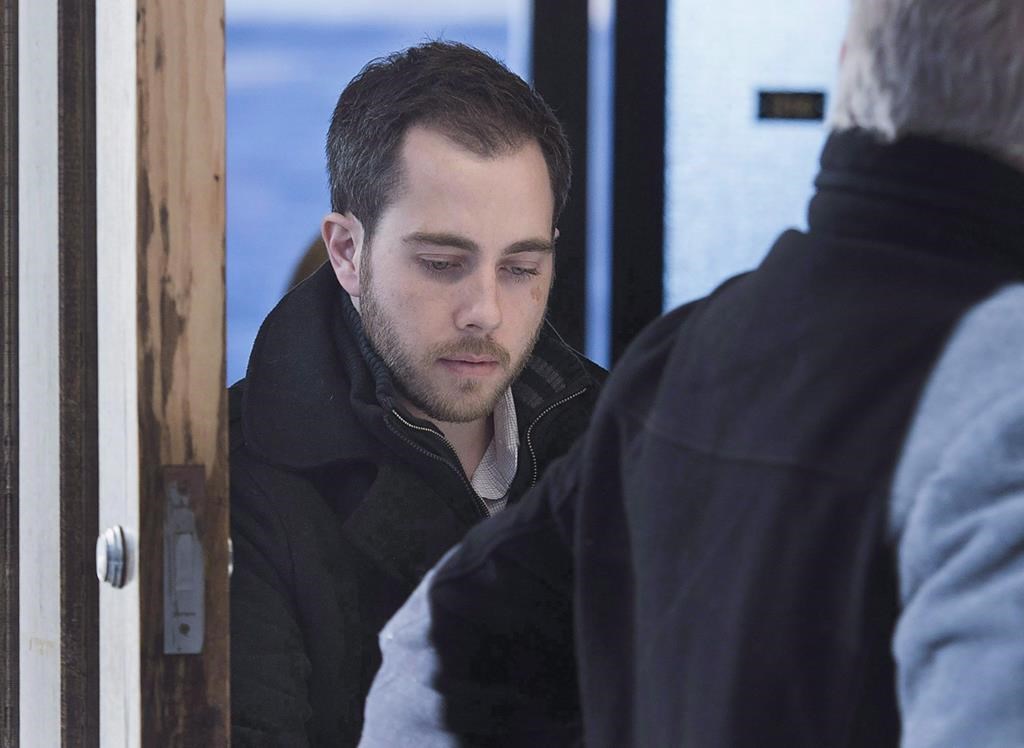Three judges have reserved their decision as to whether the case of a Halifax man who killed an off-duty police officer should be re-examined.

Christopher Garnier, who was convicted of second-degree murder and interfering with a dead body in the September 2015 death of Catherine Campbell, has appealed both his murder charge and sentence of life in prison without chance of parole for 13.5 years.
Garnier didn’t appear in Nova Scotia’s Court of Appeal on Tuesday, but his lawyer argued there were legal errors in his trial that may have impacted the jury’s finding of guilt in December 2017.
Most were on the part of the trial judge, who did not give the jury enough information on the phenomenon of false confessions, and gave them too much information in respect to inadmissible evidence, said defense attorney Roger Burrill.
Both Campbell and Garnier’s family attended the appeal, but declined to speak to reporters.
READ MORE: Christopher Garnier appealing ‘manifestly excessive’ sentence for strangling off-duty copy
On Sept. 11, 2015, Garnier met 36-year-old Campbell at a downtown Halifax bar. He took her back to a friend’s apartment, where he beat her and eventually strangled her death. He put her body in a compost bin and concealed it near the Macdonald Bridge.
Garnier was picked up by police in the subsequent days and confessed during an eight-and-a-half-hour interrogation. That video now forms the basis for much of his appeal.
Burrill argued that Garnier was pressured into a false confession by his interrogators, who repeatedly emphasized the importance of him speaking to them “now.” That resulted in Garnier misunderstanding his legal circumstances, he said, crossing a line past moral inducements and into a grey zone the trial judge should have paid more attention to.
“…The trial judge erred in that he was looking for explicit inducements,” Burrill explained to the Court of Appeal’s three-member panel.

Get breaking National news
“He didn’t find them and he did not ask himself the question, from what we’ll say is a view of 30,000 feet, ‘Was there something more?'”
Burrill said Justice Joshua Arnold ought to have given the jury more information on how false confessions are obtained, and instructed them to take that into account in their deliberations.
“The next step here (for the judge) would have been naturally, to say, ‘Take a look at the manner in which this interview was undertaken,'” he said. “While it may be admissible and was ruled admissible, you need to be very careful when you assess admissions that are taken in this context.”

- Hundreds defrauded in door-to-door Ontario scam, Canada-wide warrants issued
- ‘I couldn’t stop crying’: Memorial grows for 5-year-old boy killed in home
- Quebec’s public security minister accuses gangs of using teens ‘to do their dirty work’
- Associate of Frenchman on trial for mass rape admits to copycat abuse
Burrill took issue next with the lack of information Arnold provided to the jury on post-offence conduct and after-the-fact evidence, and what it can be used for.
In the hours and days after Campbell’s murder, Garnier concealed her body and resumed his routine, attending a birthday party and going back to work. Without adequate instruction from a judge, juries may punish the accused not for the crime itself, but for the aggravating conduct after the crime, he said.
He also accused the judge emphasizing the question of consent between Garnier and Campbell for activities that took place at the friend’s apartment, creating a “persistent sense of overwhelming sexuality.” Garnier was not charged with sexual assault, Burrill argued, which may have confused the jury when it comes to consideration of the facts in the case.
Crown attorney Mark Scott picked these arguments apart in court, stating that “jury instruction has to be correct, but it’s not required to be perfect.”
“It has to be adequate for the nature and circumstances of the evidence and issues before the court. That’s really what it was that we were discussing today,” he told reporters after the appeal’s conclusion.
Scott submitted to the panel of judges that both Garnier’s trial lawyer and judge were “extremely capable” and aware of the rights of an accused, and that all attorneys endorsed the judge’s instructions to the jury at the time, after having reviewed them. It’s possible the judge could have been more thorough, he noted, but that doesn’t mean there was any legal error made.
Scott also disputed Burrill’s suggestion that 13.5 years without parole is an unreasonable sentence for Garnier, and when it comes to allegations that Garnier’s confession was obtained through inappropriate inducement, he pointed out that the tape shows Garnier was respected by police, alert, aware of his legal rights as he requested a lawyer, and countering some of the police’s statements.
“The nature of the questioning that came under fire here would be something that would be important to keep an eye on what the court of appeal says,” Scott told reporters.
“Because if the court were to conclude in these circumstances that what was said constituted an inducement or quid pro quo, then it would certainly have an impact on police practices.”
The judges will release a written decision on Garnier’s appeal in the months to come.
READ MORE: Christopher Garnier to serve 13.5 years in prison without eligibility of parole
In the years after Garnier’s case, outrage has been building up nationwide over Veterans Affairs Canada’s decision to pay for treatment for Garnier’s PTSD – a mental illness his lawyer had argued was brought on by the murder.
At a court hearing in August, a Crown lawyer confirmed Garnier was being seen by a private psychologist, and that Veterans Affairs was covering the cost because his father is a veteran who has also been diagnosed with PTSD.
With files from The Canadian Press








Comments